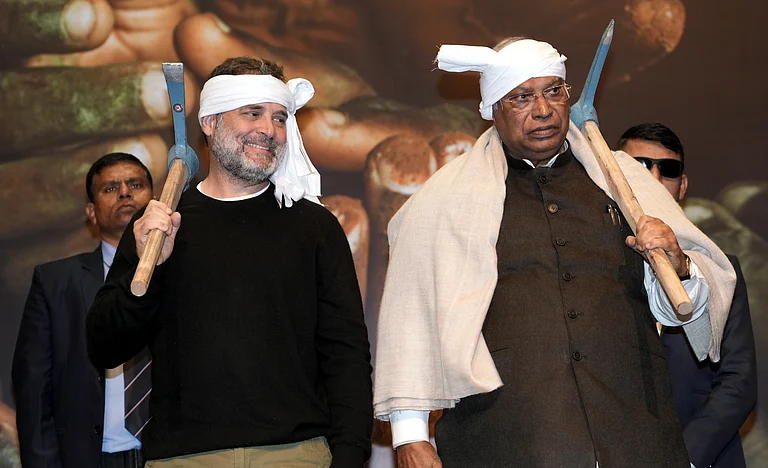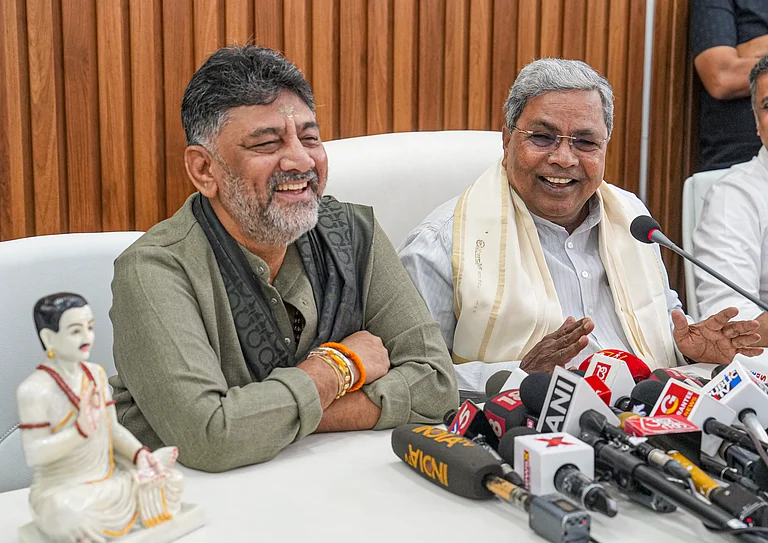On April 13, 2024, the villagers of Hapur district, Uttar Pradesh, welcomed an unusual guest. They poured out of their homes and flooded the streets. Some stood on the terraces, admiring the view. They smiled at him, clicked his photos, showered him with petals. They screamed slogans, sang songs, and danced. Arun Govil had flipped the conventions of devotion: Lord Ram had come to meet his devotees. Standing in a car, Audi Q7, almost as wide as the cramped gullies, he folded his hands and waved at them, as the songs praising Ram, blaring from the loudspeakers, sliced the air. Govil, the Bharatiya Janata Party (BJP) candidate from Meerut, presented a unique opportunity for the party’s supporters. When they chanted “Jai Shri Ram” in his presence, it performed multiple functions: venerating Govil’s role as Ram in Ramayan (1987), linking Hindu mythology to the BJP, and tying the God to the prime minister (who had said three months ago that his “government draws inspiration from Lord Ram”).
Around two-thirty in the afternoon, a man handed Govil a bow and an arrow. Not long after, a gold-coloured mace. Two teenage boys ambled to his car and touched his feet. “Our future member of parliament, our popular leader, Ramayan’s Ram-ji is here,” informed the frequent announcements, tying the past and the present, the person and the persona. Sometimes they removed the Ramayan reference and straight-up declared “our Ram-ji”, connecting Govil’s victory to Modi’s to the BJP’s manifesto: making India the third-largest economic power by 2047.

Amid the glowing promise of the future stood a man stuck in time: Govil—1987, Ram; 2024, Ram. Like an actor in a biopic that refuses to end, like a mortal condemned to be God. An actor who had played diverse characters for a decade till 1987, he got fewer roles after the mythological series, as Bollywood filmmakers, revering a formula and an image, couldn’t see him beyond Ram. But what failed in cinema can excel in politics. Because the charged rhetoric of the BJP, often invoking the past, uses temporal elasticity to weave new dreams and open old wounds: the “century-old slavery”, the Islamic invaders, the Ram rajya.
If Govil-the actor is frozen in time, then Govil-the leader is frozen in the car: He neither talks to the voters nor walks with them. He doesn’t unveil his promise, optimism, or ambition. Like his enigmatic smile in the TV series, he’s an enigma himself. In early April, when a reporter asked him whether he was aware of “Meerut’s main issues”, Govil said, “I haven’t begun thinking about them, my friend. I’m focusing on elections right now.” When asked the same question on camera a week later, he remained as vague.
“Journalists often ask me about the issues I’ll fight the elections on,” he told me in the evening in his car on the way to Meerut. “Arre, I don’t even have to open my mouth.” He smiled. “The people who come to meet me [see me as Ram]; they don’t say anything and neither do I. It’s not required—we’ve a direct connection.” On the day of the Ram temple consecration, a thought came to him—“I don’t know how”—that he should do “jan seva” [public service]. Unlike opening a non-profit, politics attracted him more. Besides, he chose the BJP because Modi’s work impressed him, and his was the only party that spoke about “raashtravaad”. “What do you call it in English?” He asked me. “Nationalism?” I said. He was taken back. “Patriotism?” I gave a softer alternative. “No, let’s stick to Hindi—raashtravaad.”

Since Govil always stayed in his car through the afternoon, it was impossible to follow him on foot. To keep pace, I hopped on the back of a pickup truck accommodating the BJP supporters. They chit-chatted, raised slogans, and bantered. A man cracked a sexist ‘joke’; a woman shut him down. Soon, another man said, “This world has no ideal men, only Shri Ram.” A woman replied, “Even He wasn’t a complete man. He left his wife based on hearsay. No man should do that.”
Govil had battled a similar dilemma, around three-and-a-half decades ago, in an interview with an American journalist, Jonah Blank. While praising many virtues of Ram, Govil also said, “What he does to his wife at the story’s end, I could never do. What good husband would?” But he still called Ram and Sita “the perfect couple”. Sitting in the same living room, his wife, Lekha, clicked her tongue. “Perfect couple? Hardly. Ram is a fundamentally weak character”, someone who had “doubt[ed] his wife” and questioned her fidelity. “Why, if Arun treated me the way Ram treated Sita, I’d hit him on the head with a frying pan!”
The ‘Ram’ in Meerut, two weeks before the 2024 elections, elicited diverse views. “I only know him as an artist,” said Suresh Rai near a roadside eatery. “If I’ve seen him as Ram in Ramayan, then I’ve also seen him in Bistar.” He pulled up a photo on his phone: Govil in bed with a woman wrapped in a towel. The eatery’s owners, Alok and Divya Dixit, didn’t agree on politics: she liked Govil (“for his life-long good character”); her husband had last voted for Rajiv Gandhi.
“I want Modi-ji to win, so I’ll choose Arun Govil,” said Anita, a few minutes after the actor entered her locality to eat breakfast at a Dalit family’s home. She reeled off the government’s benefits: “free cylinder and ration” and “Modi-ji will give whatever else we need in the future”. A young man at the end of her lane, Titu, said “communal violence” and “crime rate” had come down, roads had improved, and that he’d vote for any BJP candidate due to “Yogi and Modi”.
Like some politicians prone to ideological flip-flops, Govil’s political profile, no matter how limited, has also swung both ways.
Even the other Meerut residents, outside a mall under construction, praised Modi, ranging from a private sector professional to the owner of a roadside stall, Graduate Kadhi Chawal, who, after his Bachelor of Arts degree, struggled to find meaningful employment. “It’s not as if unemployment wasn’t there before,” he said, dissociating his personal condition from his political choice. In Meerut, Ram was the icing; Modi was the cake.
The billboards, too, reinforced the BJP’s dominance. The ones with Arun Govil—accompanied by the pictures of Modi, Yogi, and more than a dozen local leaders—outnumbered the ones for the Samajwadi Party (SP) in the ratio 10:1 (with the Bahujan Samaj Party (BSP) shrunk to a near-negligible presence). The SP had changed its candidates twice—dropping Bhanu Pratap Singh and Atul Pradhan (with 38 criminal cases)—and settled for the ex-mayor Sunita Varma whose name on the hoardings accompanied her caste in brackets, “(Jatav)”. (The BJP, too, played that game: On the morning of April 13, Govil had eaten breakfast at a Jatav family’s home, sitting on the floor.)
But the people of Meerut who disapproved of Govil (or Modi) flagged the same two concerns. “Modi-ji hasn’t spoken about unemployment. The price hike has gone out of control—petrol, diesel, onion,” said Sanjeev Balyan, a civil contractor and an erstwhile farmer. “Only rich businessmen are reaping the benefits of this government.” On the one hand, added Balyan, the government boasted about the booming economy, but on the other, “it’s giving free food grains to 80 crore people”. Even he believed, though, that Govil would win.
The BJP rally tearing through the Hapur villages demonstrated its confidence. It didn’t look like an election campaign but a victory march—topped off by dhol beats. Govil didn’t contribute much—and he didn’t have to—because he had Hindutva pop. One after the other, its songs amplified the BJP’s message—the celebration of Lord Ram, the assertion of Hindu identity, the promise of developed India—drowning its supporters in endless frenzy. Wearing Yogi and Modi masks, some even at the back of their heads, they danced on the streets holding the BJP flags. The Hindutva songs at the rally, departing from the tradition of bhajans or soft melody, blended heavy techno and aggressive vocals—the new anthems of, as some numbers made it clear, the “Hindu rashtra”.
But whenever the rally snaked through a Dalit-dominated village, the Hindutva pop stopped, so did the Jai Shri Ram chants. The campaign settled on a more staid style instead, where a recorded announcement asked for votes in a sing-song voice, followed by, without fail, “Babasaheb Ambedkar amar rahein, Kanshi Ram amar rahein [long live Babasaheb Ambedkar and Kanshi Ram].” Add and remove, plug and play: this election campaign could have been designed on MS Excel.
Like some politicians prone to ideological flip-flops, Govil’s political profile, no matter how limited, has also swung both ways. In the late ’80s, he had campaigned for the Congress party (in Ram’s costume). He reflected on that experience, remaining calm and soft-spoken, alternating between Hindi and English: “There was no motive or thought behind it. Mr Rajiv Gandhi called and asked me to meet him. Now who will say no to a Prime Minister?” Gandhi even offered him a “by-election seat in Faridabad”, but Govil declined because he was shooting for Ramayan. “I’d have won like this.” He snapped his fingers thrice.
When the interview was done, I got down from the car, around 30 minutes from Meerut. Dusk had begun to fall and the relative quiet air—no longer reverberating with Hindutva pop—felt like a stark contrast. Among all the numbers, though, one had got stuck in my head—a gentle bhajan recast into a muscular Hindutva mould, a song that tied it all together: “Ram naam ki loot hai, loot sake toh loot/antakaal pacchtayega jab pran jayenge chhoot [Loot whatever you can in the name of Ram/ otherwise regret will fill you moments before you die].”
MORE FROM THIS ISSUE
Tanul Thakur in Meerut
This appeared in the print as 'Divine Dividend'


































